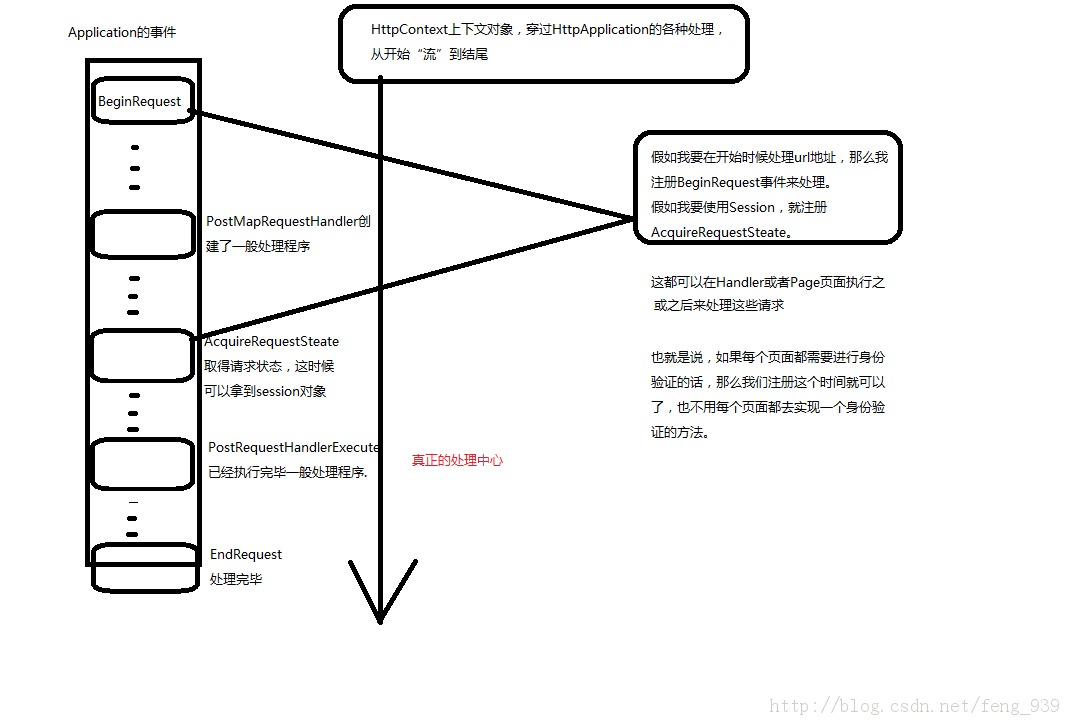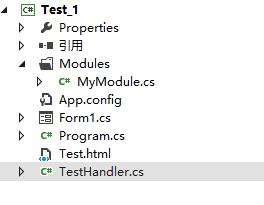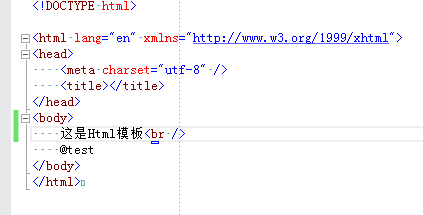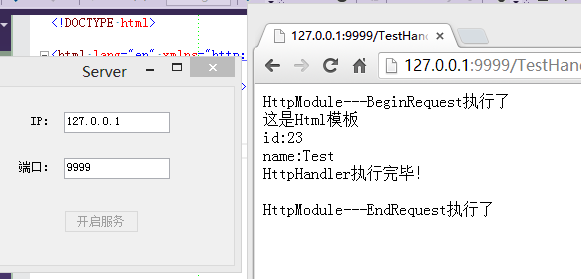我们介绍过了浏览器和服务器之间的交互过程,接下来介绍Asp.net处理动态请求。
写自己的Asp.Net框架,我们不会引用System.Web这个程序集,我们只需要创建要给自己的类库,所以在接下来的程序中,我们所用到的Web组件都是我们自己定义的。
首先创建一个程序集名为MyWebApplication,定义了如下一个HttpContext类型,它封装了上下文对象。
一、HttpContext定义了三个属性:
表示当前服务器请求——HttpRequest
服务器响应——HttpResponse
一个"工具类"——HttpServerUtility
public class HttpContext { public HttpContext(string strRequest); public HttpRequest Request { get; } public HttpResponse Response { get; } public HttpServerUtility Server { get; set; } }
与真实的底层有些差别,真实的底层,上下文封装比较繁琐,当然它足够强大。
在这里,我们就简单的讲请求报文进行分类,把分类的数据结果交给HttpRequest来保管:
HttpRequest的构造函数,接受一个请求报文,对请求报文进行截取分类,
我们在这里就只挑拣两个必须的用到的数据url和httpMethod。
NameValueCollection是一个字典类型的集合,它对Get请求的数据进行了封装,以供我们可以根据不同的参数获取不同的响应数据 Request.QueryString[]嘛,很熟悉吧。
public class HttpRequest { public HttpRequest(string strRequest); public string HttpMethod { get; set; } public NameValueCollection QueryString { get; set; } public string Url { get; set; } }
HttpResponse里提供了Write方法,最后输出都要转换为byte字节的,Write(stringresponseStr)的方法是对输出的文本进行累加,输出的时候统一转为了byte字节。 CreateResponseContent这个方法就是在输出的时候对响应报文(ResponseBody和ResponseHead)进行了整合。
public class HttpResponse { public HttpResponse(HttpRequest request); public HttpRequest Request { get; set; } public byte[] ResponseBody { get; } public byte[] ResponseHeader { get; set; } public void CreateResponseContent(); public void Write(byte[] b); public void Write(string responseStr); }
HttpServerUtility就提供了一个方法,为了替换Html模板,对虚拟路径与程序集下的物理路径进行了映射:
public class HttpServerUtility : MarshalByRefObject { public HttpServerUtility(); public string MapPath(string path); }
二、HttpApplication对象
这个对象是构成Asp.Net管道的核心对象,实际的HttpApplication是通过反射的方式来创建的,而且此方法要抽象很多,我们在下一篇文章会介绍实际的HttpApplication是怎么回事。
我们的HttpApplication里面定义了19个事件,HttpModule就是对这些事件进行注册。
InitInternal方法是HttpApplication的初始化方法,它在ProcessRequest方法里会被执行;InitInteranl方法中,调用了一个InitModules方法初始化所有的HttpModele。
ProcessRequest方法是绑定并开始执行所有HttpModule里注册的事件,并在第7-8个事件根据请求的url路径,
通过反射的方式创建了HttpHandler,在第11-12个时间中执行了HttpHandler的ProcessRequest方法。
1 public class HttpApplication : IHttpHandler 2 { 3 public HttpApplication(); 4 5 public HttpContext Context { get; set; } 6 7 public event EventHandler AcquireRequestState; 8 public event EventHandler AunthorizeRequest; 9 public event EventHandler AuthenticateRequest; 10 public event EventHandler BeginRequest; 11 public event EventHandler EndRequest; 12 public event EventHandler LogRequest; 13 public event EventHandler PostAcquireRequestState; 14 public event EventHandler PostAuthenticateRequest; 15 public event EventHandler PostAuthorizeRequest; 16 public event EventHandler PostLogRequest; 17 public event EventHandler PostMapRequestHandler; 18 public event EventHandler PostReleaseRequestState; 19 public event EventHandler PostRequestHandlerExecute; 20 public event EventHandler PostResolveRequestCache; 21 public event EventHandler PostUpdateRequestCache; 22 public event EventHandler PreRequestHandlerExecute; 23 public event EventHandler ReleaseRequestState; 24 public event EventHandler ResolveRequestCache; 25 public event EventHandler UpdateRequestCache; 26 27 28 29 30 private void InitModules(); 31 32 public void InitInternal(); 33 public void ProcessRequest(HttpContext context); 34 }
HttpModule:
HttpApplication里的事件是按顺序执行的,HttpContext就是从HttpApplication的开始 "流" 到结束,这过程中就是这一些列事件来对HttpContext的请求进行处理的,有些事件在到达真正的处理中心(一般处理程序处理)之前就可以执行,或之后执行。比如:AuthenticateRequest是验证请求,用在获取用户信息的时候;PostAcquireRequestState这里以获取到了Session,这这个事件之后才能获取的session。
所以我们可以在不同的时间注册不同的事件来更好的扩展HttpApplication的请求处理.

在这里没有用配置文件去指定HttpModule,而是指定了一个HttpModules的文件夹,遍历这个文件夹下所有的cs文件,通过反射的方式创建成IHttpModule,执行其Init方法
private void InitModules() { HttpModuleCollection moduleCollection = new HttpModuleCollection(); if (Directory.Exists("Modules")) { string[] modulesPath = Directory.GetFiles("Modules"); foreach (string item in modulesPath) { if (File.Exists(item)) { if (Path.GetExtension(item) == ".cs") { string moduleName = Assembly.GetEntryAssembly().GetName().Name + ".Modules." + Path.GetFileNameWithoutExtension(item); IHttpModule module = Assembly.GetEntryAssembly() .CreateInstance(moduleName) as IHttpModule; moduleCollection.AddModule(moduleName, module); module.Init(this); } } } } }
在IHttpModule里面,就只有一个Init方法,这个方法通过HttpApplication类型,可以在这里注册HttpApplication的事件响应方法:
public interface IHttpHandler { void ProcessRequest(HttpContext context); }
IHttpHandler:这个就和我们的一般处理程序一样了,我们在一个类里继承这个接口,实现此ProcessRequest方法。
HttpHandler是Http请求真正的处理中心,在HttpApplication的事件管道中被创建执行。
public interface IHttpHandler { void ProcessRequest(HttpContext context); }
大概就这些了,我们整理一下思路:
当一个http请求到达服务器,服务器通过监听socket请求,获取到http请求报文,HttpContext封装http请求,HttpApplication对象的ProcessRequest方法来处理这个请求,最后封装响应报文,响应给浏览器。
现在,我们来试验一下:
先把我们自己写的Asp.Net的程序集编译成一个dll文件;像上一篇文章一样,创建一个WinForm应用程序,引入我们的MyWebApplication程序集。
监听客户端请求可以这么改一下了
1 while (true) 2 { 3 Socket clientSocket = serverSocket.Accept(); 4 byte[] data = new byte[1024 * 1024]; 5 int len = clientSocket.Receive(data, 0, data.Length, SocketFlags.None); 6 if (len <= 0) 7 { 8 clientSocket.Shutdown(SocketShutdown.Both); 9 clientSocket.Close(); 10 continue; 11 } 12 string strRequest = Encoding.UTF8.GetString(data, 0, len); 13 HttpContext context = new HttpContext(strRequest); //创建上下文对象 14 if (context.Request.Url.EndsWith(".aspx") 15 || context.Request.Url.EndsWith(".ashx")) 16 { 17 HttpApplication application = new HttpApplication(); 18 application.ProcessRequest(context); //创建Application,并执行PR方法 19 } 20 else //如果是静态文件,找到其路径,读取为byte字节放入输出流 21 { 22 string fileData = Path.Combine(AppDomain.CurrentDomain.BaseDirectory + context.Request.Url.TrimStart('/').Replace('/', '\\')); 23 if (!File.Exists(fileData)) 24 { 25 context.Response.Write("不存在此路径"); 26 } 27 else 28 { 29 context.Response.Write(File.ReadAllBytes(fileData)); 30 } 31 } 32 clientSocket.Send(context.Response.ResponseHeader); 33 clientSocket.Send(context.Response.ResponseBody); 34 clientSocket.Shutdown(SocketShutdown.Both); 35 clientSocket.Close(); 36 } 37 }, socket);
然后,我们创建一个Modules文件夹,用来放扩展HttpModule文件。 --MyHttpModule
创建一个继承自IHttpHandler的处理程序 --SimpleHandler


1 public class MyModule : IHttpModule 2 { 3 public void Init(HttpApplication context) 4 { 5 context.BeginRequest += context_BeginRequest; 6 context.EndRequest += context_EndRequest; 7 } 8 9 //HttpApplication里最后一个事件 10 void context_EndRequest(object sender, EventArgs e) 11 { 12 HttpApplication app = sender as HttpApplication; 13 HttpContext context = app.Context; 14 context.Response.Write("<br />HttpModule---EndRequest执行了<br />"); 15 } 16 17 //这是HttpApplication里的第一个事件 18 void context_BeginRequest(object sender, EventArgs e) 19 { 20 HttpApplication app = sender as HttpApplication; 21 HttpContext context = app.Context; 22 context.Response.Write("HttpModule---BeginRequest执行了<br />"); 23 } 24 }
我们也试验一下HttpModule扩展:
1 public class MyModule : IHttpModule 2 { 3 public void Init(HttpApplication context) 4 { 5 context.BeginRequest += context_BeginRequest; 6 context.EndRequest += context_EndRequest; 7 } 8 9 //HttpApplication里最后一个事件 10 void context_EndRequest(object sender, EventArgs e) 11 { 12 HttpApplication app = sender as HttpApplication; 13 HttpContext context = app.Context; 14 context.Response.Write("<br />HttpModule---EndRequest执行了<br />"); 15 } 16 17 //这是HttpApplication里的第一个事件 18 void context_BeginRequest(object sender, EventArgs e) 19 { 20 HttpApplication app = sender as HttpApplication; 21 HttpContext context = app.Context; 22 context.Response.Write("HttpModule---BeginRequest执行了<br />"); 23 } 24 }
启动我们的服务器访问:
http://127.0.0.1:9999/TestHandler.aspx?id=23&name=Test
我们把这个.cs类就作为一个动态请求,后面加aspx或者ashx。
可以看到,我们的HttpModule在这里也生效了:
首选执行了HttpModule里注册的BeginRequest事件
然后输出了HttpHandler里面执行的结果,还有get请求的参数…HttpHandler执行完毕!
最后执行HttpModule里面注册的EndRequest事件

源码下载